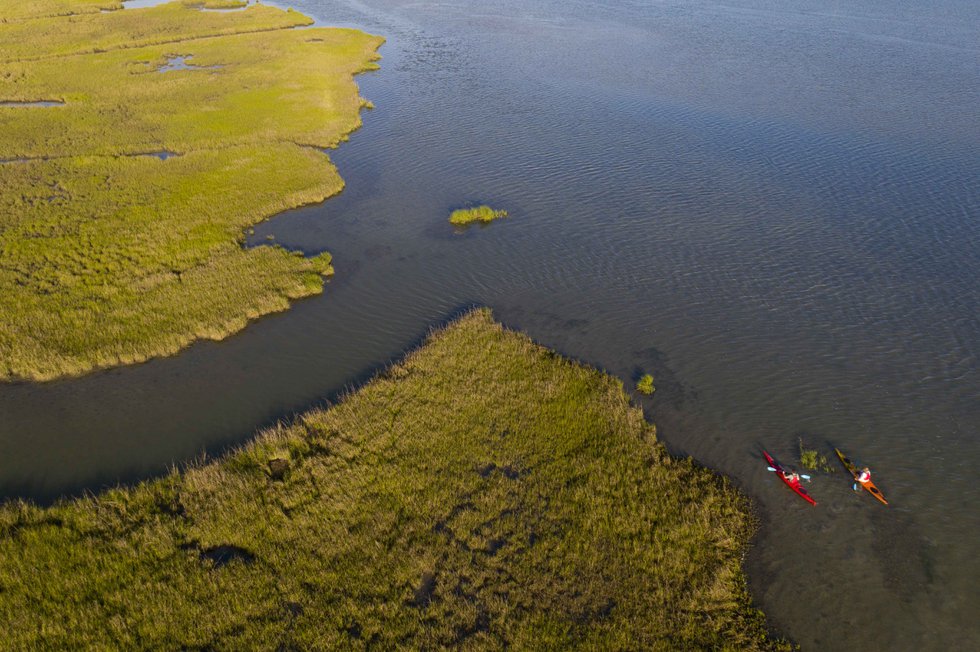Want to watch people at Virginia Beach? Head for the boardwalk. Want to catch a wahoo, tuna or marlin? Head for Rudee Inlet, a hot spot for sport fishing.

Fish Stories – Feature
Captain Mike Romeo will never forget the day. On August 30, 1978, he was running a charter boat that caught the second-largest fish ever caught in the state—a blue marlin that weighed in at 1,093 pounds and 12 ounces. A gentleman named Edward A. Givens landed the fish; atypically, he was the only male in a fishing group of five, the other four being ladies he had met the night before. According to Romeo, he and his mate got the blue marlin gaffed very quickly, in just 12 minutes, “but after that, all hell broke loose.” It took another eight and a half hours, and a second boat, to actually secure the mammoth fish, during which time, recalls the captain, “I lost a motor, my bilge pump failed and we had water in the boat. But we ended up getting it.”
While the Virginia Beach boardwalk is the spot for strolling and people watching in the seething summer months, Rudee Inlet, at the south end of the beach, is the place to go for those who want to get out in the open water, to see or catch big fish. Visitors can hop aboard cruisers that aim to sight whales or dolphin, or get happy on a 2,000 horsepower party boat named the Rudee Rocket. Or one can hire one of a dozen charter boats that travel up to 30 miles offshore in the hope of landing a whopper.
John Crowling, dockmaster and general manager of the Virginia Beach Fishing Center at Rudee Inlet, says his marina hosts the only charter fleet at the beach—12 boats that run from July 1 through February. And, he adds, nearly all of the captains are salty dogs. Romeo, who started working on boats in 1972, has operated his own boat, the Gannet, since 1978. Two of his colleagues, David Wright and Steve Richardson, have been captains for about the same length of time. They and their crews spend the hot summer months chasing mackerel, bluefish and other fish on so-called “in-shore” or “near-shore” trips, and tuna, wahoo, dolphin and marlin when they venture into deep water. Boats in the fleet range in size from 46 to 59 feet.
“I love it every day I’m out there,” says Romeo, 53, who has just completed a sport fishing tournament in Cape Hatteras, on North Carolina’s Outer Banks. That’s where he and other charter captains fish in late spring and early summer before moving north to Virginia for the hot-weather months. “The summer [offshore] fishing starts down here,” he says, “and then, when the water gets hot, moves north up the coast where the water is a little cooler. The fish don’t like 85-degree water; they like water that is 73 to 76 degrees.”
The Virginia Beach Fishing Center is the hub of the Rudee Inlet scene. It sells tackle, food and clothing, takes charter reservations and operates two marinas on either side of the Rudee Inlet Bridge. The one outside the bridge “has no height restrictions, so the biggest boats can get in,” says Crowling, who has been working at the fishing center for 17 years. Virginia Beach is a good stopping point for boats heading from Florida to the northeast for the summer, he adds, “so we get a tremendous amount of transient traffic.” Owners of big boats especially like this way station because of its easy access. “We’re right off the ocean—easy to get in and easy to get out. Most boaters will rent a slip, get hooked up to water and electricity, fuel up, and then leave at daylight.”
Crowling says that the recession has pinched the offshore business the last couple of years, “but half-day inshore trips actually have increased because they are more affordable. We’re seeing charters pick up some this year over last. People have readjusted.” And, he adds, “We don’t have many weather cancellations, because we don’t get much wind. We’ve got some boats that will run every day for 35 or 40 days.”
No charter captain could complain about that. Romeo says that one year to the day after he landed the record blue marlin, another client hooked one that was even larger—but “he took all my line and got away.” The biggest ones always do, leaving the fishermen with only the story.








